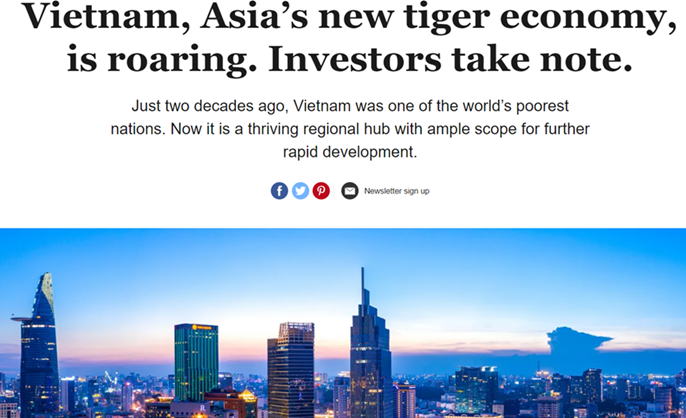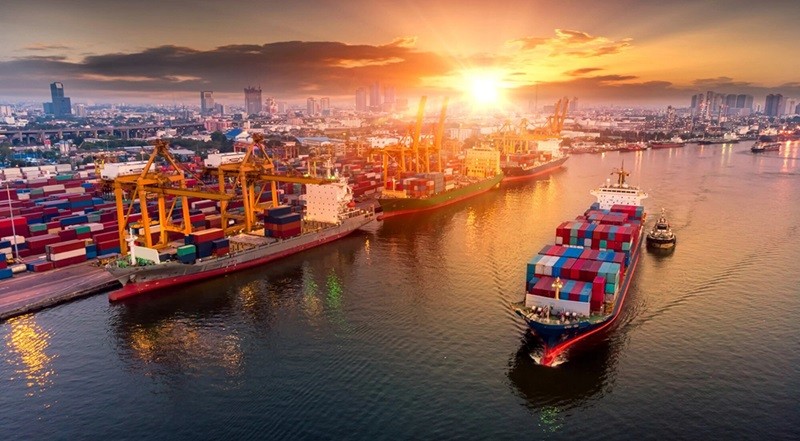
British weekly investment magazine: Vietnam as an Asia’s new tiger economy is roaring
Latest
 |
| The article "Vietnam, Asia’s new tiger economy, is roaring. Investors take note" on British weekly investment magazine moneyweek.com. (Screenshot taken from Money Week) |
Huge space for development
A recent article on moneyweek.com (British weekly investment magazine) titled "Vietnam, Asia’s new tiger economy, is roaring. Investors take note" confirmed Vietnam is currently a prosperous center in the region with much development potentials and becomes attractive to foreign investors.
At the beginning of the analysis, the author wrote: "Just two decades ago, Vietnam was one of the world’s poorest nations. Now it is a thriving regional hub with ample scope for further rapid development".
The article pointed out that Vietnam dominates the smartphone sector, largely due to the huge investment of Samsung Group. Vietnam is planning to shift from the “labour-intensive” textile and assembly industry to highly profitable sectors such as semiconductors.
This fact attracts foreign investors interested in Vietnam under increasing pressure to diversify the supply chain.
Besides, the article mentions Vietnam's marginal market advantages. Accordingly, this booming economy has received attention from foreign investors, but not much because Vietnam has not yet been classified as an emerging market (EM) by the US financial company MSCI and is currently only classified as an emerging market (EM) and just a “frontier market”.
Above features puts Vietnam’s stocks in the same category as Benin, Kazakhstan and Serbia. An upgrade to emerging market (EM) status would prompt large inflows from funds that track the benchmark EM index, delivering a boost to local stocks of an estimated $5bn-$8bn.
Vietnamese stocks are the single largest component of the frontier-markets sector, and foreign investors have spent recent years betting that an upgrade for such a dynamic emerging economy was only a matter of time.
According to the article, the stock market is also one of the aspects that investors need to pay attention to. Vietnam records lower inflation than many Western economies. This allows the State Bank to cut interest rates four times in 2023, causing retail investors to rush into the stock market in search of higher returns than depositing money in banks.
The author of the article commented that for investors, the volatile nature of the local stock market means that Vietnam isn’t yet one to put at the centre of a portfolio, but it still merits a nibble.
In case of upgrade, Vietnamese stocks will have a strong boost. Even as a frontier market, Vietnam is still an attractive market.
 |
| there are reasons for optimism of 2045 goals. (Photo: VGP) |
Being optimistic about the 2045 goals
A 2019 report from Brookings, an American think tank, noted that “in order to become a high-income country by 2045, Vietnam will need to sustain average growth rates of at least 7% over the next 25 years”. That will become harder as the low-hanging fruit of workers moving “from lower-productivity agriculture to higher-productivity manufacturing” is picked. Vietnam’s low wages are a key attraction for inward investment, but that advantage can’t last forever if the end goal is a richer society.
Yet there are also reasons for optimism. Vietnamese GDP per capita still sits at $4,000. That is less than one-third of the global average, so there should still be plenty of straightforward “catch-up” growth to come before the middle-income trap threatens to bite.
According to the article, many countries find their path to high-income status blocked by low levels of human capital that keep their workforces locked into mundane factory jobs. Yet Vietnam spends significantly more on education as a percentage of GDP than its immediate neighbours.
Its students have the second-longest learning-adjusted years of schooling in Southeast Asia, behind only wealthy Singapore, according to the World Bank’s data. Vietnam’s human capital index is the highest among lower-middle-income economies. Vietnam’s educated, entrepreneurial workforce thus looks well-equipped to secure their country a pay increase.
Vietnam has been dubbed the new Asian tiger, bringing to mind the rapid development of Republic of Korea, Taiwan (China), Hong Kong (China) and Singapore in the latter half of the 20th century. Vietnamese investors certainly hope that the country can emulate the example of the earlier tigers to climb into the high-income bracket, defined by the World Bank as those countries with a gross national income per capita above $13,845.
The article also notes that Vietnamese need only look to their immediate neighbours in Southeast Asia to see that the path to prosperity can be a bumpy one. In the 1990s Thailand and Malaysia also produced impressive growth, but struggled to regain their old momentum in the years following the 1997 Asian financial crisis. Therefore, the way to the success is not easy.





















